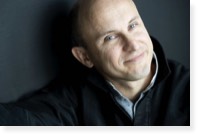 ‘Eric has an approach to music which makes complete sense to me because he understands the real sense of art. His approach has a direct connection to our universe and all the unknown.’
‘Eric has an approach to music which makes complete sense to me because he understands the real sense of art. His approach has a direct connection to our universe and all the unknown.’
MARIA JOÃO PIRES
Category: Testimonials
Testimonials
Jan Jiracek von Arnim
 This was an inspiring read for me, though I knew before many of the things Eric Schoones writes about, they are presented in such a masterfully focused writing style, compressed down to the true essentials of Zen in music. This is a book every musician should read, and not just once. Highly recommended!
This was an inspiring read for me, though I knew before many of the things Eric Schoones writes about, they are presented in such a masterfully focused writing style, compressed down to the true essentials of Zen in music. This is a book every musician should read, and not just once. Highly recommended!
JAN JIRACEK VON ARNIM
Martha Argerich
 ‘This book is very interesting, bravo!’
‘This book is very interesting, bravo!’
Martha Argerich
Bruno Monsaingeon
I really liked it very, very much, Walking up the Mountain Track is a fascinating book. It’s an undogmatic inspiration to performers, composers (and in fact all artists), as to what music-making and artistic creation should be like, and unfortunately not always are! It must consist in what one hears, sees and feels in one’s inner self, and not in what one is told to do by fashion, dogma, convention, or any external factors.
BRUNO MONSAINGEON
Christa Ludwig
 ‘This book by Eric Schoones Walking up the Mountain Track is a true milestone to awaken our consciousness. Music is the right median to uplift people spiritually. The quality of Zen is a reality in all things and helps people from the Western culture, through music, to understand this spiritual reality. In this book famous artists from various disciplines relate about their spiritual experience. Zen and music connect here most beautifully, enriching our lives.’
‘This book by Eric Schoones Walking up the Mountain Track is a true milestone to awaken our consciousness. Music is the right median to uplift people spiritually. The quality of Zen is a reality in all things and helps people from the Western culture, through music, to understand this spiritual reality. In this book famous artists from various disciplines relate about their spiritual experience. Zen and music connect here most beautifully, enriching our lives.’
CHRISTA LUDWIG
Elly Ameling
Dear, much admired Eric Schoones,
Now I come to thank you very sincerely for ‘Walking up the Mountain Track’, a book that will always accompany me in the years that remain. I call it a miracle how you have managed to collect and organize all these wise remarks, reflections of so many great artists. Your book is a diamond cut with infinitely many facets.
ELLY AMELING
Hélène Grimaud
 ‘A wonderful and precious book.’
‘A wonderful and precious book.’
HÉLÈNE GRIMAUD
Elizabeth Sombart
 ‘I’ve just completed the reading of your book. I relished every page of it. What an extraordinary book. Every pianist in the world should read it. It’s the source of immense knowledge and information.
‘I’ve just completed the reading of your book. I relished every page of it. What an extraordinary book. Every pianist in the world should read it. It’s the source of immense knowledge and information.
What a brilliant idea to centre the book on Zen and interview each musician on the essence of it. Zen has a profound place in my life. I too search for silence and I passionately read the book by Herrigel. What an inspiration and guide it has been throughout my life.
Reading your book re-centred me. I loved your chapters on Celibidache. I was reminded of his teaching and the time I spent with him when learning the phenomenology of music. You captured his spirit and philosophy.
Loved all the quotes you included. What research you have done. I feel inspired to work harder and deeper. Congratulations on this monumental book!’
ELIZABETH SOMBART
Malcolm Singer
‘Many have acknowledged the connections between Zen practice and musical practice, but none have done it quite so explicitly as Eric Schoones, with this treasure-chest of quotations from both Zen and musical writings. Shunryu Suzuki’s Zen Mind, Beginner’s Mind has long been a favourite of mine, and to see quotations from this book linked so appropriately with the thoughts of so many great musicians – Busoni, Schnabel, Celibidache, Menuhin and Horowitz to name but a few – is a revelation. A must-read for all those interested in the mysteries of top quality music-making.’
MALCOLM SINGER, former Director of Music at the Yehudi Menuhin School of Music
Alexander Gavrylyuk
 ‘In our modern, at times incautiously animated world, Eric Schoones’s work is especially significant. His tireless research resulted in a fascinating book, Walking up the Mountain Track.
‘In our modern, at times incautiously animated world, Eric Schoones’s work is especially significant. His tireless research resulted in a fascinating book, Walking up the Mountain Track.
One cannot help, but feel that by combining wisdom from the greatest masters of classical music, paralleled by the knowledge of Eastern philosophies, Mr. Schoones uncovered the big secrets behind the universal truth that is mirrored in true art and music. What could be better guidance and inspiration! It is an ingenious work. An eye opening reminder of what is truly important. This book is a jewel, a real bible for any musician.’
ALEXANDER GAVRYLYUK
Stuart Isacoff
‘The artistic process is a mystery, but that hasn’t stopped philosophers and musicians across the centuries from plumbing its depths in the search for meaning. Eric Schoones has organized a roadmap for the journey to the core of the puzzle, quoting great artists and thinkers on such aspects as practice, ego, and the emptiness of unknowing, and framing it all in the context of Zen. The result is truly enlightening. Whether he is citing pianist Dinu Lipatti on discovering emotional truth, Eugene Herrigel on detachment, Glenn Gould on giving free rein to your desires, or Sergei Rachmaninoff on the limitations of following rules, this collection is a must for any musician’s bookshelf.’
STUART ISACOFF, author & critic
Nelson Goerner
 ‘A truly fantastic and fascinating book, full of deep insights for the connoisseurs and also for those interested in having a closer look on how a great interpreter works with the composer and within himself. A warmest BRAVO!!!’
‘A truly fantastic and fascinating book, full of deep insights for the connoisseurs and also for those interested in having a closer look on how a great interpreter works with the composer and within himself. A warmest BRAVO!!!’
NELSON GOERNER
David Dubal
‘Eric Schoones has written a book that will be read many times.’
Here is a Zen journey which finds us in an unexpected cultural musical and pianistic garden of wonder.
DAVID DUBAL
Boris Berman
‘Very interesting and thought-provoking.’
BORIS BERMAN
Joseph Moog
‘Eric Schoones’ book Walking Up the Mountain Track gave me answers to many of my questions as an artist. Not only did I find that I’m in great company with some of my thoughts and feelings, but most importantly reading this outstanding book opened up new perspectives. It is the ideal encyclopaedia for much of the philosophy behind the performing arts.’
JOSEPH MOOG
Etsuko Hirose
I really adored this book, I think every student of all the conservatories should read this, I would have liked to read it before. Eric Schoones describe so well the link between the music and Zen, which could be so helpful to eliminate every useless thoughts and ego, and the author shows many hints of the path to achieve the truth. Being Japanese I grew up in Japan until I was 15, and this Zen mind is quite familiar for me, we are influenced whether you want it or not by Buddhism, which explains partly Japanese people’s mentality – kindness, dignity, ego lessness, fatalism etc. At the same time, I was thinking that precisely this advantage could also be a disadvantage because in the actual world, it looks like all that matters is the quick success and the marketing with superficial images. But this book reminded me the positive side of things and to understand how to connect intelligently Western art and Eastern philosophy.
I remember when I played the Mozart Concerto with orchestra at 6, I just enjoyed the situation without knowing the meaning of “stage fright”. And now, to be in this mind state, I should have recourse to meditation, philosophy, stretching etc. So complicated not to be anxious before the concert! But in the end, there is no magic wand, you just have to practice, and in a smart way!
ETSUKO HIROSE
Zen Hu
‘A wonderful journey through time — including for me personally the exact reflection of the most intense, insightful, and inspiring period of my musical life. This book so movingly and closely captures the wonderful years of joint music making with the Münchner PhiIharmoniker under Celibidache and his Zen way.’
ZEN HU
Hie-Yon Choi
‘Reading Walking up the Mountain Track, every now and then, I have to stop and smile recalling my last teacher, late Gyorgy Sebok. I ponder a certain sentence and it becomes alive like a moving light, brightens my mind…. and I would like to hold that sensation as long as I can. I want to turn the pages as slowly as I can.’
HIE-YON CHOI
Margreet Honig
‘Reading this book has proven very interesting. All artists seek an equilibrium between intellect and emotion. And above all there is the need to let go! We learn to be patient. A wonderful book!’
MARGREET HONIG
Mark Ainley
‘This book communicates with beauty and directness the higher realms that great musicians seek to access and express. Schoones captures the essence of Lipatti’s character, philosophy, and music-making in a vivid and direct manner that makes for engrossing reading.’
MARK AINLEY, piano recording historian and critic
Roberto Prosseda
 ‘Reading Walking up the Mountain Track has been a deep and enriching experience for me. I could find here several ideas on the sense of music-making, tied to some more general thoughts on the human existence, which I feel as part of my own approach to music and life. Still, I could never read them in such a clear and poetic form as they are expressed here.
‘Reading Walking up the Mountain Track has been a deep and enriching experience for me. I could find here several ideas on the sense of music-making, tied to some more general thoughts on the human existence, which I feel as part of my own approach to music and life. Still, I could never read them in such a clear and poetic form as they are expressed here.
This book is a perfect companion for any pianist or music lover, as it provides a lot of information and ideas about the piano performance, showing how it is always deeply connected with our spiritual dimension. It is also striking to note how many of the greatest musicians in the history, here quoted, shared a similar view on music and life.
Any reader will find this book of great interest and will discover how music, and more in general, the “art of listening” can bring a great improvement to our life.’
ROBERTO PROSSEDA
Andrè Gallo
 ‘A book written with great experience and intuition; giving rise to various, profound meditations. I was fascinated by the form chosen by Mr. Schoones to accompany us on a walk between thoughts and streams of consciousness that does not have time or place. The book weaves together cultures and concepts of spiritual and artistic paths, of choices and hardships, of diversity which, in truth, point to a collective identity.
‘A book written with great experience and intuition; giving rise to various, profound meditations. I was fascinated by the form chosen by Mr. Schoones to accompany us on a walk between thoughts and streams of consciousness that does not have time or place. The book weaves together cultures and concepts of spiritual and artistic paths, of choices and hardships, of diversity which, in truth, point to a collective identity.
This is a book that reminds us to be souls… before trying to become acclaimed artists.’
ANDRÈ GALLO, Professor at Accademia Pianistica “Incontri col Maestro” di Imola
Katja Avdeeva
‘After reading this book you understand what it means to be musician.’
KATJA AVDEEVA
Marc Pantillon
‘Walking up the Mountain Track influences my daily work at the piano, I was already convinced working at a slow tempo was useful, but now I do it in a more concentrated and slower way which really works well…’
MARC PANTILLON
Kajeng Wong
‘It was not a coincidence, but serendipity when this book captured my attention by its name. Carefully and comprehensively searching for the unity of the mind with our body, this book is a fine read for anyone who is interested in a zen and wholistic perspective to music-making.
The concept of ‘absence of mind’ is a curious phenomena that rhymes in the teaching in Buddhism, Yoga and Christianity. Personally I have always strived for such level of calm but intense awareness through meditation and spiritual learnings. Drawing from experiences of top artists, this book is definitely a revelation to how spiritual living connects with music-making.’
KAJENG WONG